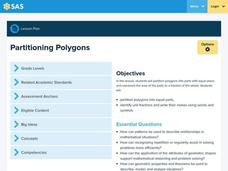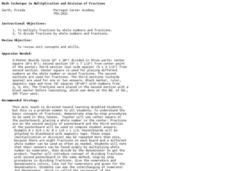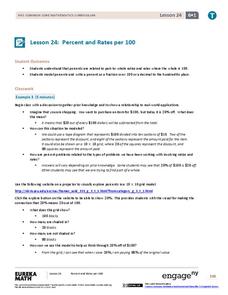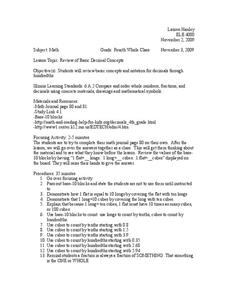Curated OER
Comparing Fractions 7
In this elementary math worksheet, 3rd graders compare circle graphs written as fraction models to determine the correct ratio value for the 2 questions.
Mary Pope Osborne, Classroom Adventures Program
Mummies in the Morning Egyptian pyramids, hieroglyphics
Visit the Magic Treehouse and take your class on a trip through time with a reading of the children's book Mummies in the Morning. Using the story to spark an investigation into Egyptian culture, this literature unit engages...
Curated OER
Fraction Strips
Get a handle on equivalent fractions through the use of manipulatives. Using area models, sets, and length manipulatives like fraction strips and Cuisenaire rods, the class will gain a deeper understanding of equivalent fractions....
Curated OER
Math Technique in Multiplication and Division of Fractions
Young scholars multiply and divide fractions. In this math lesson, students are given explicit visual instruction of how to work with fractions. Intended for learning disabled young scholars, the teacher demonstrates how to manipulate...
Curated OER
Grid and Percent It
Students explore percent. In this percent lesson, students investigate how to represent percentages on a hundreds grid. Working independently, students solve mathematical problems involving percentages.
Curated OER
Dream Car Math
Pupils collect car cost comparison data from the "Car Wizard" web site to use as problem solving and for calculations related to math.
Pennsylvania Department of Education
Using Manipulatives with Fractions
Students are introduced to the concept of using manipulatives when working with fractions in real life situations. In this using manipulative with fractions activity, students make connections about when manipulatives aid...
Curated OER
Parts Per Million
Pupils perform serial dilution of food coloring experiment with partner, examine concentration levels, and differentiate parts per million (PPM) and parts per billion (PPB). Students complete pre-lab and post-lab questions and data table.
Curated OER
The Sum of the Parts
Second graders observe some everyday common objects in order to attempt to learn about simple systems and how they fit together. They observe small details in order to identify the parts of a whole design.
Curated OER
Budgeting - The Basics, Part 1
Students investigate personal budgets and discuss how to make monetary decisions. They work in small groups to make money decisions for their classrooms or a playground, and present their decisions to the whole class.
EngageNY
Percent and Rates per 100
What percentage of your class understands percents? Pupils learn the meaning of percents based upon rates per 100 in the 24th lesson in a series of 29. They represent percents as fractions, decimals, ratios, and models. The scholars...
Mascil Project
Container Logistics
Here's a creative lesson that lets pupils be creative as well! While considering many different factors, learners devise a plan to increase the efficiency of container shipments. The design of the activity encourages creative,...
Ohio Department of Education
Fraction and Decimal Equivalency
Mathematicians make representations of fractional parts of a whole and learn that a decimal is another way to represent a fractional part. Understanding is extended by comparing and ordering fractions and decimals on a number line. This...
Curated OER
Fractions!
Second graders observe and design manipulatives showing fractional parts. In this fractional part lesson, 2nd graders create a paper hamburger using circle fractions. Students navigate a website to find fractional parts of a...
Curated OER
Watermelon Graphing
Students discover bar graphs. In this primary math lesson plan, students identify the parts of watermelon seeds and other seeds. Students learn the proper names and common names which refer to the parts of the seeds as they create a bar...
Curated OER
Fractions of a Sheet Cake
Second graders become familiar with the fractions in a whole. In this sheet cake lesson, 2nd graders view a Count on it clip about pumpkin pies. Students cut a sheet cake into eight parts and write as a fraction. ...
Curated OER
I'll Halve S'More, Please!
Students describe a fraction in terms of sharing parts of a whole. They understand the meaning of the parts of a fraction and add and subtract like fractions. They apply fractions to problem situations and recognize and use equivalent...
Curated OER
Fraction Frenzy
Second graders identify fractions as part of a set. They explain concrete and symbolic representations of whole numbers, fractions, decimals, and percents in real-world situations. They complete a web-based cookie baking instructional...
Curated OER
Get Ready, Get Set, Hibernate
Students match each body part or idea from a work bank about methods of animal adaptations for winter survival. They observe as the first one, food is covered with the whole class before completing the rest of the diagram. They discuss...
Curated OER
Fractions
First graders create fraction creatures by using 1 inch squares of construction paper. In this fractions lesson plan, 1st graders name the fractions within their whole creatures.
Curated OER
Decimal Concepts
Fourth graders complete a journal page to review decimal concepts. In this decimal lesson, 4th graders use manipulatives to represent decimal amounts. Students complete a homework sheet related to decimal and fractional parts.
Curated OER
Fraction Conversion 2 (With Percents)
Fifth graders determine how to convert fractions, decimals, and percents. In this conversion lesson, 5th graders use an on-line applet to practice making these conversions. They review how to make the conversions in a whole class lesson...
Curated OER
Study Buddies: Working With Fractions
In this math worksheet, students will work with a coach to solve a fractions story problem. Students will follow a step-by-step process and notes are provided for the coach.
Curated OER
Veggie Chop and Data Analysis
First graders chop vegetables into fractions. In this fractions lesson, 1st graders cut vegetables, collect data about favorite vegetables and create a bar graph using the information. Students make inferences about the data and...























